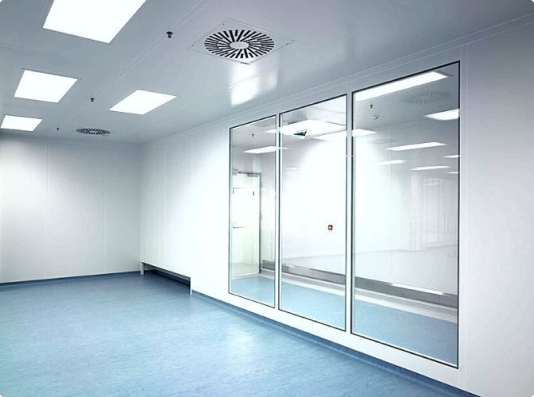Introduction to Cleanrooms in South Africa
Cleanrooms are specialized environments designed to maintain minimal levels of pollutants such as dust, airborne microbes, and chemical vapours. In South Africa, the demand for cleanroom technology has been steadily rising due to advancements in industries like pharmaceuticals, electronics, and biotechnology. These environments play a crucial role in ensuring product integrity, safety, and compliance with international standards.
What is a Cleanroom?
A cleanroom is a controlled environment where pollutants are maintained within strict limits. This is achieved through advanced air filtration systems, precise temperature controls, and rigorous cleaning protocols. Cleanrooms are classified based on the number and size of particles permitted per volume of air, with standards such as ISO 14644 and Federal Standard 209E being widely used.
Importance of Cleanrooms Across Industries
- Pharmaceutical Manufacturing: Ensures sterile conditions for drug production, minimizing contamination risks.
- Electronics and Semiconductor Industries: Protects delicate components from particulate damage during assembly.
- Healthcare and Laboratories: Provides a controlled environment for sensitive tests and research.
- Food and Beverage Sector: Guarantees hygienic conditions for high-quality production.
Key Components of a Cleanroom
Air Filtration Systems
At the heart of any cleanroom is an efficient High-Efficiency Particulate Air (HEPA) or Ultra-Low Penetration Air (ULPA) filtration system. These filters trap particles as small as 0.3 microns, ensuring clean, recirculated air.
Temperature and Humidity Control
Maintaining optimal temperature and humidity levels is vital for preventing the proliferation of microorganisms and ensuring equipment operates efficiently.
Cleanroom Garments
Personnel working in cleanrooms must wear specialized garments, including gloves, masks, and coveralls, to minimize contamination risks.
Monitoring Systems
Advanced monitoring systems track air quality, temperature, and humidity levels in real time, ensuring consistent compliance with regulatory standards.
Design and Construction of Cleanrooms in South Africa
Modular Cleanroom Design
South Africa has seen a growing trend toward modular cleanroom systems, which offer flexibility, quick installation, and cost-efficiency. These designs are ideal for industries that require scalable solutions.
Custom Cleanroom Solutions
Companies often require tailor-made cleanrooms to meet specific industry needs. From selecting the right materials to designing workflows, customization ensures that all operational requirements are met.
Energy Efficiency
With a global focus on sustainability, cleanroom providers in South Africa are increasingly incorporating energy-efficient systems, such as low-energy lighting and optimized HVAC systems, into their designs.
Regulations and Standards for Cleanrooms in South Africa
ISO 14644 Standards
ISO 14644 is the globally recognized standard for cleanroom classification and testing. Compliance ensures that cleanrooms in South Africa meet international quality benchmarks.
Good Manufacturing Practices (GMP)
Cleanrooms used in pharmaceutical and healthcare industries must adhere to GMP guidelines, ensuring that products are consistently high-quality and safe for consumers.
Local Compliance
In addition to international standards, Cleanrooms south Africa must comply with local health and safety regulations to protect both employees and the environment.
Top Providers of Cleanroom Solutions in South Africa
Several leading companies in South Africa offer end-to-end cleanroom solutions, including design, construction, and maintenance services. These providers cater to industries such as biotechnology, automotive, and food production.
- Cleanroom Specialists: Experts in designing modular and custom cleanrooms.
- Advanced Filtration Services: Providers of high-quality HEPA and ULPA filters.
- Integrated Environmental Solutions: Focused on energy-efficient cleanroom systems.
Maintenance and Cleaning Protocols
Scheduled Cleaning
Cleanrooms must undergo routine cleaning protocols using specialized equipment and cleaning agents to maintain stringent cleanliness levels.
Validation and Testing
Regular testing ensures that filtration systems, airflow patterns, and environmental conditions comply with established standards. Validation processes include particle count tests and airflow visualization studies.
Employee Training
Proper training is essential to ensure that employees understand and adhere to cleanroom protocols, minimizing contamination risks.
Challenges and Opportunities in South Africa’s Cleanroom Industry
Challenges
- High Initial Investment: Setting up a cleanroom involves significant capital expenditure.
- Skill Shortage: More trained professionals are needed to manage and maintain cleanrooms effectively.
- Regulatory Compliance: Keeping up with evolving international and local standards can be challenging.
Opportunities
- Growing Industries: The rise of pharmaceutical, biotechnology, and electronics sectors offers immense growth potential for cleanroom providers.
- Technological Advancements: Innovations such as smart monitoring systems and modular designs are driving efficiency and reducing costs.
- Global Demand: South Africa’s strategic location makes it a hub for cleanroom manufacturing and export to other regions.
Read Also: The Ultimate Solution for Fuel Storage: Double-Walled Underground Storage Tanks
Conclusion
Cleanrooms are indispensable for industries requiring stringent environmental controls. In South Africa, advancements in cleanroom technology are enabling businesses to achieve higher standards of quality and compliance. By investing in the latest cleanroom solutions and adhering to international standards, companies can ensure their products’ integrity and safety.
